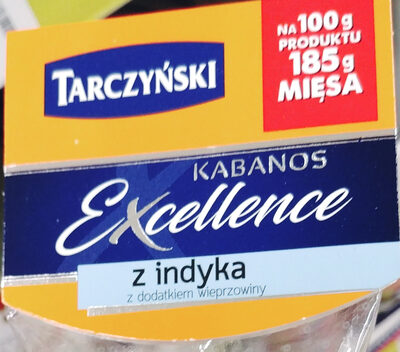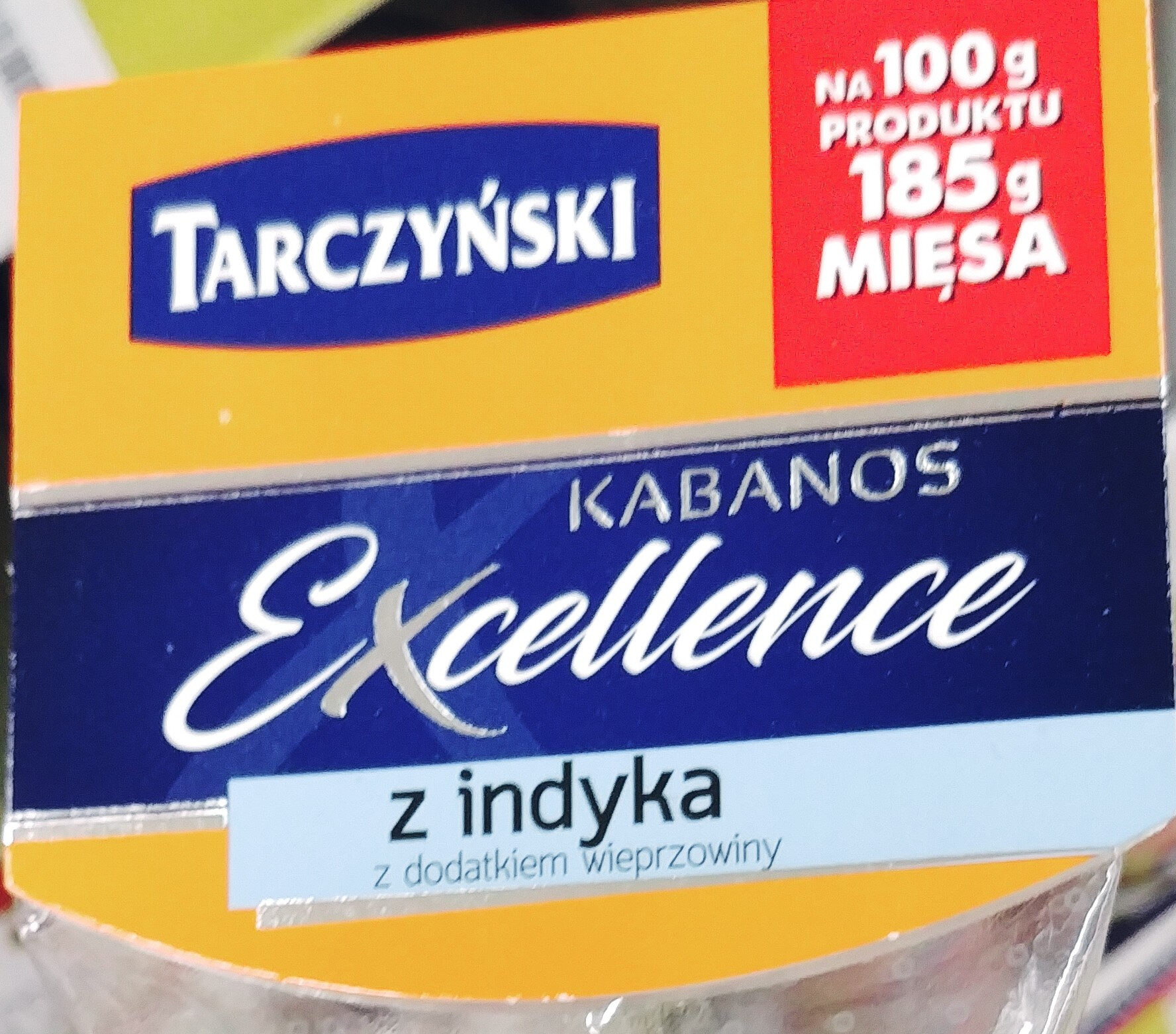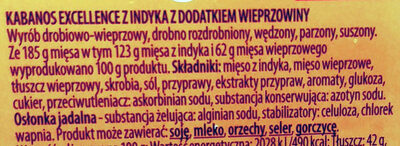Help us make food transparency the norm!
As a non-profit organization, we depend on your donations to continue informing consumers around the world about what they eat.
The food revolution starts with you!
Kabanos excellence z indyka z dodatkiem wieprzowiny - Tarczyński - 100 g
Kabanos excellence z indyka z dodatkiem wieprzowiny - Tarczyński - 100 g
This product page is not complete. You can help to complete it by editing it and adding more data from the photos we have, or by taking more photos using the app for Android or iPhone/iPad. Thank you!
×
Barcode: 5908230524639 (EAN / EAN-13)
Common name: Wyrób drobiowo-wieprzowy, drobno rozdrobniony, wędzony, parzony, suszony.
Quantity: 100 g
Brands: Tarczyński
Categories: Meats and their products, Meat preparations, Prepared meats, Sausages, Cured sausages, Turkey and its products, Poultry sausages, Turkey preparations, Polish meat products, Turkey sausages, pl:Kabanosy
Labels, certifications, awards: No colorings, pl:Bez dodatku fosforanów, pl:Bez dodatku glutaminianów, pl:PL-059-102
Manufacturing or processing places: Polska
Traceability code: PL 02200303 WE
Stores: Biedronka
Countries where sold: Poland
Matching with your preferences
Health
Ingredients
-
20 ingredients
Polish: mięso z indyka, mięso wieprzowe, tłuszcz wieprzowy, skrobia, sól, przyprawy, ekstrakty przypraw, aromaty, glukoza, cukier, przeciwutleniacz (askorbinian sodu), substancja konserwująca (azotyn sodu). osłonka jadalna [substancja żelująca (alginian sodu), stabilizatory (celuloza, chlorek wapnia)].Traces: Celery, Milk, Mustard, Nuts, Soybeans
Food processing
-
Ultra processed foods
Elements that indicate the product is in the 4 - Ultra processed food and drink products group:
- Additive: E401 - Sodium alginate
- Additive: E460 - Cellulose
- Ingredient: Flavouring
- Ingredient: Gelling agent
- Ingredient: Glucose
Food products are classified into 4 groups according to their degree of processing:
- Unprocessed or minimally processed foods
- Processed culinary ingredients
- Processed foods
- Ultra processed foods
The determination of the group is based on the category of the product and on the ingredients it contains.
Additives
-
E250 - Sodium nitrite
Sodium nitrite: Sodium nitrite is the inorganic compound with the chemical formula NaNO2. It is a white to slightly yellowish crystalline powder that is very soluble in water and is hygroscopic. It is a useful precursor to a variety of organic compounds, such as pharmaceuticals, dyes, and pesticides, but it is probably best known as a food additive to prevent botulism. It is on the World Health Organization's List of Essential Medicines, the most important medications needed in a basic health system.Nitrate or nitrite -ingested- under conditions that result in endogenous nitrosation has been classified as "probably carcinogenic to humans" by International Agency for Research on Cancer -IARC-.Source: Wikipedia
-
E301 - Sodium ascorbate
Sodium ascorbate: Sodium ascorbate is one of a number of mineral salts of ascorbic acid -vitamin C-. The molecular formula of this chemical compound is C6H7NaO6. As the sodium salt of ascorbic acid, it is known as a mineral ascorbate. It has not been demonstrated to be more bioavailable than any other form of vitamin C supplement.Sodium ascorbate normally provides 131 mg of sodium per 1‚000 mg of ascorbic acid -1‚000 mg of sodium ascorbate contains 889 mg of ascorbic acid and 111 mg of sodium-. As a food additive, it has the E number E301 and is used as an antioxidant and an acidity regulator. It is approved for use as a food additive in the EU, USA, and Australia and New Zealand.In in vitro studies, sodium ascorbate has been found to produce cytotoxic effects in various malignant cell lines, which include melanoma cells that are particularly susceptible.Source: Wikipedia
-
E460 - Cellulose
Cellulose: Cellulose is an organic compound with the formula -C6H10O5-n, a polysaccharide consisting of a linear chain of several hundred to many thousands of β-1→4- linked D-glucose units. Cellulose is an important structural component of the primary cell wall of green plants, many forms of algae and the oomycetes. Some species of bacteria secrete it to form biofilms. Cellulose is the most abundant organic polymer on Earth. The cellulose content of cotton fiber is 90%, that of wood is 40–50%, and that of dried hemp is approximately 57%.Cellulose is mainly used to produce paperboard and paper. Smaller quantities are converted into a wide variety of derivative products such as cellophane and rayon. Conversion of cellulose from energy crops into biofuels such as cellulosic ethanol is under development as a renewable fuel source. Cellulose for industrial use is mainly obtained from wood pulp and cotton.Some animals, particularly ruminants and termites, can digest cellulose with the help of symbiotic micro-organisms that live in their guts, such as Trichonympha. In human nutrition, cellulose is a non-digestible constituent of insoluble dietary fiber, acting as a hydrophilic bulking agent for feces and potentially aiding in defecation.Source: Wikipedia
Ingredients analysis
-
May contain palm oil
Ingredients that may contain palm oil: Pork fat
-
Non-vegan
Non-vegan ingredients: Turkey meat, Pork meat, Pork fat
-
Non-vegetarian
Non-vegetarian ingredients: Turkey meat, Pork meat, Pork fat
-
Details of the analysis of the ingredients
pl: mięso z indyka, mięso wieprzowe, tłuszcz wieprzowy, skrobia, sól, przyprawy, ekstrakty przypraw, aromaty, glukoza, cukier, przeciwutleniacz (askorbinian sodu), substancja konserwująca (azotyn sodu), osłonka jadalna (substancja żelująca (alginian sodu), stabilizatory (celuloza, chlorek wapnia))- mięso z indyka -> en:turkey-meat - vegan: no - vegetarian: no - ciqual_food_code: 36301 - percent_min: 7.69230769230769 - percent_max: 100
- mięso wieprzowe -> en:pork-meat - vegan: no - vegetarian: no - ciqual_proxy_food_code: 28205 - percent_min: 0 - percent_max: 50
- tłuszcz wieprzowy -> en:pork-fat - vegan: no - vegetarian: no - from_palm_oil: maybe - ciqual_food_code: 16530 - percent_min: 0 - percent_max: 33.3333333333333
- skrobia -> en:starch - vegan: yes - vegetarian: yes - ciqual_proxy_food_code: 9510 - percent_min: 0 - percent_max: 25
- sól -> en:salt - vegan: yes - vegetarian: yes - ciqual_food_code: 11058 - percent_min: 0 - percent_max: 2.7
- przyprawy -> en:condiment - vegan: maybe - vegetarian: maybe - percent_min: 0 - percent_max: 2.7
- ekstrakty przypraw -> en:spice-extract - vegan: yes - vegetarian: yes - percent_min: 0 - percent_max: 2.7
- aromaty -> en:flavouring - vegan: maybe - vegetarian: maybe - percent_min: 0 - percent_max: 2.7
- glukoza -> en:glucose - vegan: yes - vegetarian: yes - ciqual_proxy_food_code: 31016 - percent_min: 0 - percent_max: 2.7
- cukier -> en:sugar - vegan: yes - vegetarian: yes - ciqual_proxy_food_code: 31016 - percent_min: 0 - percent_max: 0.5
- przeciwutleniacz -> en:antioxidant - percent_min: 0 - percent_max: 0.5
- askorbinian sodu -> en:e301 - vegan: yes - vegetarian: yes - percent_min: 0 - percent_max: 0.5
- substancja konserwująca -> en:preservative - percent_min: 0 - percent_max: 0.5
- azotyn sodu -> en:e250 - vegan: yes - vegetarian: yes - percent_min: 0 - percent_max: 0.5
- osłonka jadalna -> en:casing - percent_min: 0 - percent_max: 0.5
- substancja żelująca -> en:gelling-agent - percent_min: 0 - percent_max: 0.5
- alginian sodu -> en:e401 - vegan: yes - vegetarian: yes - percent_min: 0 - percent_max: 0.5
- stabilizatory -> en:stabiliser - percent_min: 0 - percent_max: 0.25
- celuloza -> en:e460 - vegan: yes - vegetarian: yes - percent_min: 0 - percent_max: 0.25
- chlorek wapnia -> en:e509 - vegan: yes - vegetarian: yes - percent_min: 0 - percent_max: 0.125
- substancja żelująca -> en:gelling-agent - percent_min: 0 - percent_max: 0.5
Nutrition
-
Bad nutritional quality
⚠ ️Warning: the amount of fruits, vegetables and nuts is not specified on the label, it was estimated from the list of ingredients: 0This product is not considered a beverage for the calculation of the Nutri-Score.
Positive points: 0
- Proteins: 5 / 5 (value: 25, rounded value: 25)
- Fiber: 0 / 5 (value: 0, rounded value: 0)
- Fruits, vegetables, nuts, and colza/walnut/olive oils: 0 / 5 (value: 0, rounded value: 0)
Negative points: 26
- Energy: 6 / 10 (value: 2028, rounded value: 2028)
- Sugars: 0 / 10 (value: 0.5, rounded value: 0.5)
- Saturated fat: 10 / 10 (value: 17, rounded value: 17)
- Sodium: 10 / 10 (value: 1080, rounded value: 1080)
The points for proteins are not counted because the negative points are greater or equal to 11.
Nutritional score: (26 - 0)
Nutri-Score:
-
Nutrient levels
-
Fat in high quantity (42%)
What you need to know- A high consumption of fat, especially saturated fats, can raise cholesterol, which increases the risk of heart diseases.
Recommendation: Limit the consumption of fat and saturated fat- Choose products with lower fat and saturated fat content.
-
Saturated fat in high quantity (17%)
What you need to know- A high consumption of fat, especially saturated fats, can raise cholesterol, which increases the risk of heart diseases.
Recommendation: Limit the consumption of fat and saturated fat- Choose products with lower fat and saturated fat content.
-
Sugars in low quantity (0.5%)
What you need to know- A high consumption of sugar can cause weight gain and tooth decay. It also augments the risk of type 2 diabetes and cardio-vascular diseases.
Recommendation: Limit the consumption of sugar and sugary drinks- Sugary drinks (such as sodas, fruit beverages, and fruit juices and nectars) should be limited as much as possible (no more than 1 glass a day).
- Choose products with lower sugar content and reduce the consumption of products with added sugars.
-
Salt in high quantity (2.7%)
What you need to know- A high consumption of salt (or sodium) can cause raised blood pressure, which can increase the risk of heart disease and stroke.
- Many people who have high blood pressure do not know it, as there are often no symptoms.
- Most people consume too much salt (on average 9 to 12 grams per day), around twice the recommended maximum level of intake.
Recommendation: Limit the consumption of salt and salted food- Reduce the quantity of salt used when cooking, and don't salt again at the table.
- Limit the consumption of salty snacks and choose products with lower salt content.
-
-
Nutrition facts
Nutrition facts As sold
for 100 g / 100 mlAs sold
per serving (100g)Compared to: pl:Kabanosy Energy 2,028 kj
(490 kcal)2,030 kj
(490 kcal)+6% Fat 42 g 42 g +11% Saturated fat 17 g 17 g +18% Carbohydrates 2.9 g 2.9 g -30% Sugars 0.5 g 0.5 g -63% Fiber - - Proteins 25 g 25 g +3% Salt 2.7 g 2.7 g -7% Alcohol - - Fruits‚ vegetables‚ nuts and rapeseed‚ walnut and olive oils (estimate from ingredients list analysis) 0 % 0 %
Environment
-
Eco-Score E - Very high environmental impact
⚠ ️Select a country in order to include the full impact of transportation.The Eco-Score is an experimental score that summarizes the environmental impacts of food products.→ The Eco-Score was initially developped for France and it is being extended to other European countries. The Eco-Score formula is subject to change as it is regularly improved to make it more precise and better suited to each country.Life cycle analysis
-
Average impact of products of the same category: E (Score: 18/100)
Category: Poultry sausage
Category: Poultry sausage
- PEF environmental score: 1.60 (the lower the score, the lower the impact)
- including impact on climate change: 14.90 kg CO2 eq/kg of product
Stage Impact Agriculture
88.5 %Processing
6.1 %Packaging
1.7 %Transportation
1.0 %Distribution
0.6 %Consumption
2.1 %
Bonuses and maluses
-
Origins of ingredients with a high impact
Malus: -1
Environmental policy: -1
Transportation: 0
Origin of the product and/or its ingredients % of ingredients Impact Poland 100 %High
-
Packaging with a medium impact
Malus: -11
Shape Material Recycling Impact Unknown Cardboard Low Unknown Plastic High ⚠ ️ The information about the packaging of this product is not sufficiently precise (exact shapes and materials of all components of the packaging).⚠ ️ For a more precise calculation of the Eco-Score, you can modify the product page and add them.
If you are the manufacturer of this product, you can send us the information with our free platform for producers.
Eco-Score for this product
-
Impact for this product: E (Score: 6/100)
Product: Kabanos excellence z indyka z dodatkiem wieprzowiny - Tarczyński - 100 g
Life cycle analysis score: 18
Sum of bonuses and maluses: -12
Final score: 6/100
-
Carbon footprint
-
Equal to driving 7.7 km in a petrol car
1490 g CO² per 100g of product
The carbon emission figure comes from ADEME's Agribalyse database, for the category: Poultry sausage (Source: ADEME Agribalyse Database)
Stage Impact Agriculture
92.2 %Processing
3.1 %Packaging
2.4 %Transportation
1.4 %Distribution
0.3 %Consumption
0.6 %
Packaging
-
Packaging with a medium impact
-
Packaging parts
(Cardboard)
(Plastic)
-
Packaging materials
Material % Packaging weight Packaging weight per 100 g of product Paper or cardboard Plastic Total
-
Transportation
-
Origins of ingredients
Origins of ingredients with a high impact
Origin of the product and/or its ingredients % of ingredients Impact Poland 100 %High
Report a problem
-
Incomplete or incorrect information?
Category, labels, ingredients, allergens, nutritional information, photos etc.
If the information does not match the information on the packaging, please complete or correct it. Open Food Facts is a collaborative database, and every contribution is useful for all.
Data sources
Product added on by pyrka
Last edit of product page on by arc2.
Product page also edited by openfoodfacts-contributors, packbot, sierigh.










